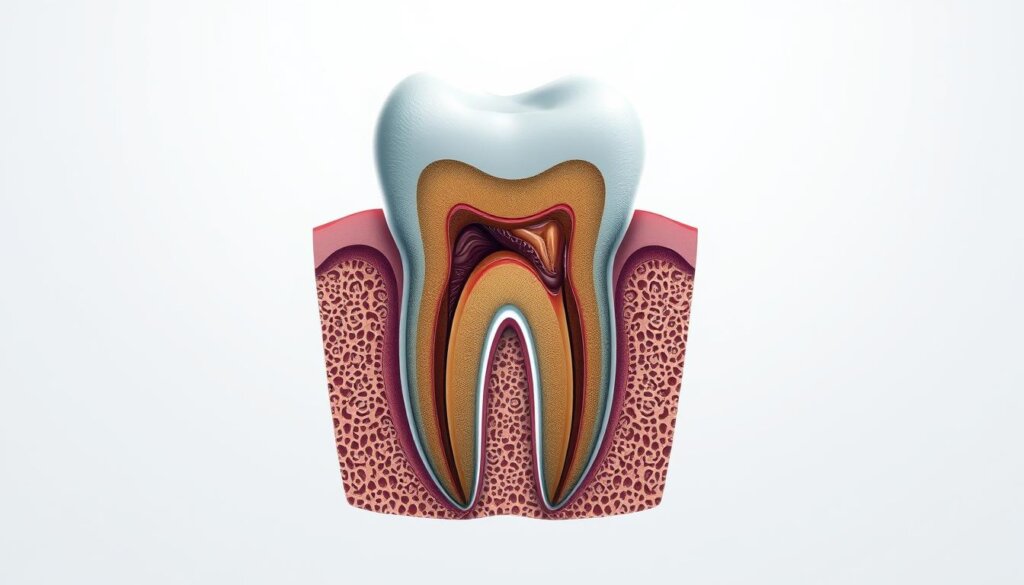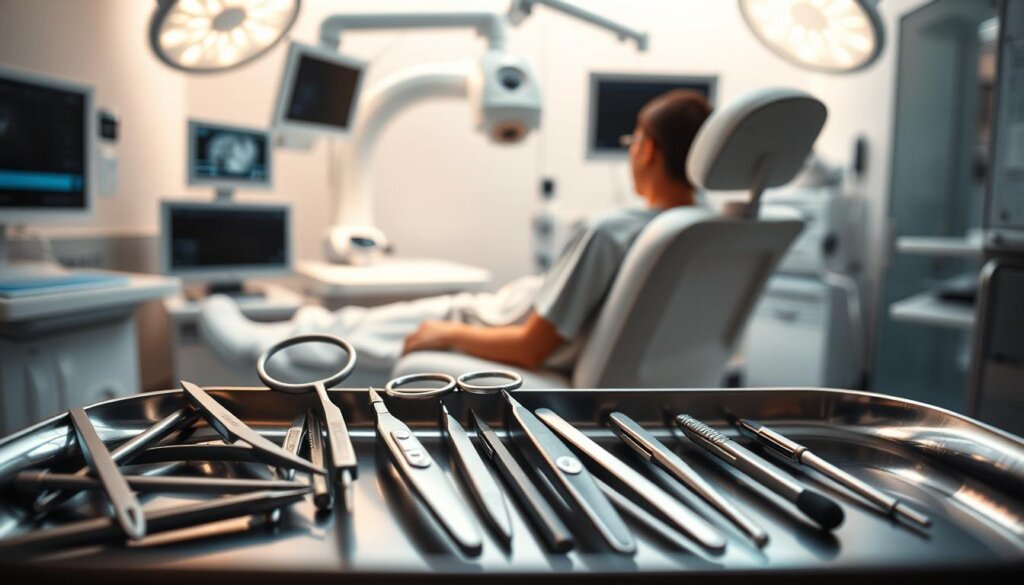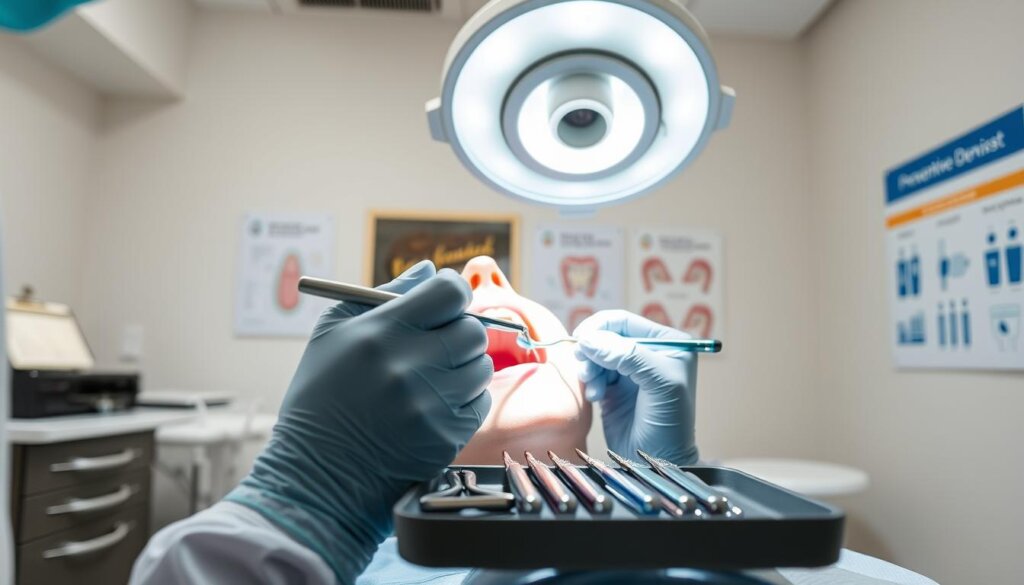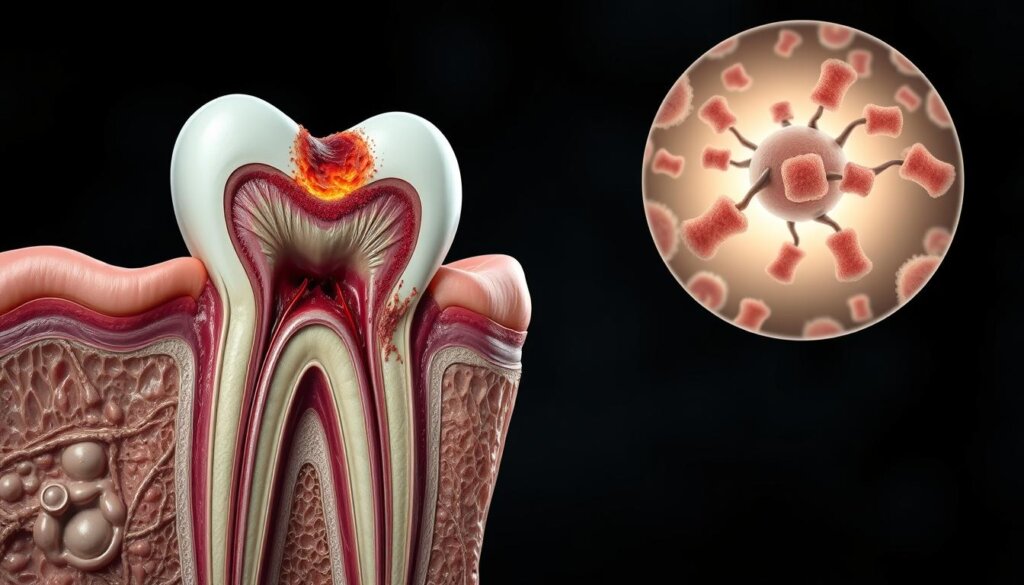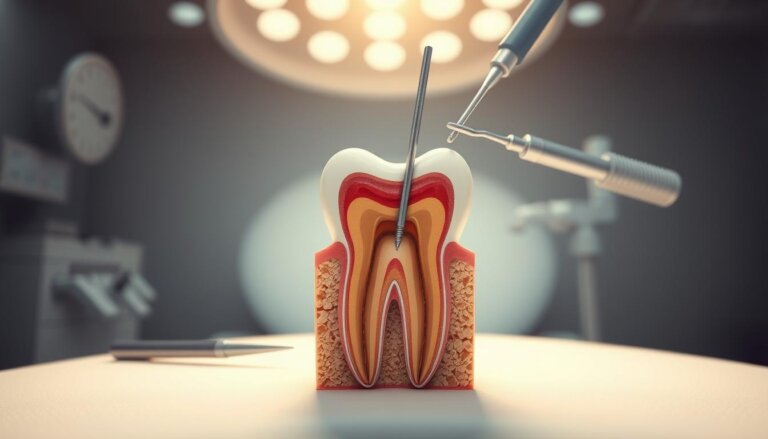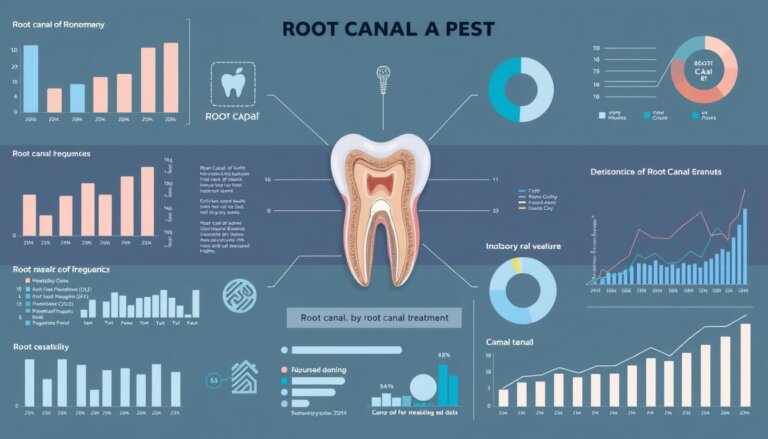What are Signs of an Infected Tooth or Nerve Damage?
Did you know that about 40% of adults in the United States have mouth pain each year? This is according to the Centers for Disease Control and Prevention (CDC). Many people ignore signs of an infected tooth, which could mean a bigger problem.
Some people feel only a little pain, while others have severe throbbing. Swelling, tooth color changes, and constant pain could mean nerve damage. Catching these signs early is key to keeping your mouth healthy and avoiding serious issues.
Key Takeaways
- Infected tooth warning signs may begin with subtle sensitivity
- Persistent throbbing pain might signal nerve involvement
- Swelling and discoloration often demand prompt evaluation
- Careful observation prevents complicated oral health threats
- Timely care helps patients avoid advanced treatment procedures
Understanding Tooth Infections
Many people wonder why small problems can turn into big issues. Infections happen when bacteria get past the tooth enamel and into the pulp. At first, symptoms might seem minor, but they can get worse fast if not treated.
What Causes Tooth Infections?
Cavities, injuries, and worn-out fillings can let bacteria in. Foods high in sugar feed these bacteria, causing acid that weakens enamel. Dry mouth, often caused by some medicines, also plays a role. Is brushing and flossing enough to fight these risks?
Factors That Increase Risk of Infection
Studies by the American Dental Association show that lifestyle choices can increase risk. Bad oral hygiene and poor diet are key factors. Here’s a table with common risks and ways to avoid them:
| Risk Factor | Prevention Strategy |
|---|---|
| Frequent Sugar Intake | Limit pastries, candies, and soda |
| Dry Mouth | Stay hydrated and discuss medication effects with a dentist |
| Improper Brushing | Use a soft-bristle brush and focus on gentle, thorough cleaning |
Common Symptoms of Tooth Infections
People often feel a sharp pain near the tooth that makes daily tasks hard. Catching these signs early can stop bigger problems. Dentists say to see them right away if you feel any discomfort, as it could mean nerve damage.
Pain and Discomfort
The pain can be mild or very strong. It gets worse when you bite or chew. Many find it hard to do simple things because of the constant pain, leading them to see a dentist.
Swelling and Inflammation
The gums, jaw, or face might swell up. This swelling puts more pressure on the tooth’s root. If not treated, it can lead to more serious issues.
Sensitivity to Temperature
Drinking hot or cold drinks can cause sharp pain. This could mean the tooth pulp is irritated. Spotting this early can save time and protect your teeth.
Signs of Nerve Damage in Teeth
Nerve problems in teeth can start quietly but are serious. Small pains might hide bigger issues. This means quick action is needed to avoid big dental problems.
Experts look for signs of tooth trouble early. They use tools like X-rays and tests to find the right treatment.
Sharp or Shooting Pain
Pain in a tooth can come without warning. It might happen when you chew or drink cold things. This pain is a sign of deeper nerve issues that need quick help.
Loss of Sensation
Some people feel numb or dull for days. This numbness means the nerves are damaged. It’s a sign of bigger oral health problems.
Changes in Tooth Color
A tooth might turn gray or darker as the nerve weakens. This change can be slow or sudden. Spotting this color change early helps prevent more problems and guides doctors on what to do next.
The Role of Abscess in Tooth Infections
An untreated infection can create a pocket of pus called an abscess. Bacteria build up, trapping fluids that cause swelling. This problem gets worse if not treated, making pain worse.
Early treatment and watching the situation closely can prevent serious problems. This is important to avoid recurring tooth pain.
What Is a Dental Abscess?
A dental abscess is a focused area of infection near a tooth’s root. Bacteria get into damaged enamel or gums, spreading harm. This can weaken tissues and lead to more issues.
Symptoms of a Dental Abscess
Signs include sharp pain, swollen gums, and a bad taste from draining fluid. Some people feel facial swelling or pain from hot foods. Seeing a dentist right away is key if you notice these signs.
Recognizing Gum Disease
Gum disease starts with mild inflammation in the gingival tissue. It can progress into serious conditions if left unaddressed. Redness and bleeding during brushing often signal the first stage of this issue.
Healthy gums support the roots that anchor each tooth. When infections set in, bone density may decrease, and the tooth structure can weaken. This environment can amplify nerve damage symptoms by letting bacteria spread near tooth roots.
Tenderness, persistent bad breath, and swollen gums might be signs of a deeper problem. Many individuals experience gum recession that exposes sensitive tooth structures. Over time, these changes could jeopardize the stability of teeth.
Early recognition is key. Dental professionals often stress routine check-ups to identify irregularities and reduce the risk of complications. In many cases, ongoing periodontal therapy improves oral health and lowers nerve damage symptoms linked to bacterial infiltration.
Connection Between Gum Disease and Tooth Health
Healthy gingiva not only reinforces bone support but also prevents harmful bacteria from accessing deeper tissues. Strong oral hygiene habits can maintain this balance and help sustain tooth vitality.
Signs of Gum Infection
Bright red or purple gums often indicate active gingival inflammation. Lingering discomfort or bleeding after gentle brushing may signal an underlying infection. A thorough examination provides insight into the severity of the condition and guides effective care.
How to Distinguish Between Tooth and Nerve Pain
It can be hard to tell if you have an infected tooth or nerve pain. Some people feel pain that changes when they chew or bite. Others get sharp pains from temperature changes. Spotting the problem early can prevent bigger dental issues.
“Statistics from the American Dental Association highlight the importance of accurately diagnosing pain sources to ensure timely intervention.”
Similarities in Symptoms
Both tooth and nerve pain can hurt your jaw. You might feel throbbing or tenderness when you touch the area. It’s important to know your medical history to figure out what’s wrong.
Key Differences
Nerve pain often comes from hot or cold things. But tooth infections hurt more when you press on them. Knowing these differences helps doctors decide what tests or treatments you need.
Importance of Early Diagnosis
Exploring possible complications can lead to timely care. Many ask, What are signs of an infected tooth or nerve damage? Catching issues early protects our teeth and prevents serious problems.
Consequences of Delayed Treatment
Infections can spread and cause unexpected pain. Ignoring bacterial growth can damage the tooth’s structure deeply. Patients may face longer healing times if they wait too long to seek help.
Ignoring problems can lead to more serious issues. These can even affect our overall health.
How Regular Dental Check-ups Help
Regular visits help dentists find small problems before they get big. Early detection makes treatments easier and less painful.
Our dental team stresses the importance of regular check-ups. This helps answer questions like What are signs of an infected tooth or nerve damage? and ensures we make the right treatment choices.
Diagnostic Procedures
Deep evaluations help find hidden causes of tooth pain. Experts use visual checks and scientific tools to find infections, nerve issues, or other problems. These steps help find the best way to treat the issue.
X-rays in Identifying Infections
Dental X-rays show signs that are hard to see with the naked eye. They reveal cracks, bone changes, or abnormal pockets. Finding these early helps start treatments that are more precise.
Pulp Vitality Tests
This test checks how the nerves inside the tooth react. If there’s little or no response, it might mean the pulp is inflamed or dead. This helps doctors choose the right treatment, saving the tooth and surrounding areas.
Treatment Options for Infected Teeth
Experts use special methods to fight off bacterial infections and keep teeth healthy. They might use medicines to help tissues heal. They also do bigger procedures to save the tooth. The goal is to stop pain, reduce swelling, and make you feel better.
Getting help quickly is key. Fast action can make a big difference when teeth are badly infected.
Antibiotics and Medications
Doctors often give antibiotics from big companies like Pfizer or Novartis. These help fight off bad bacteria in teeth. Over-the-counter pain relievers like Tylenol from Johnson & Johnson can also help with swelling and pain. Taking antibiotics for a short time works best with other treatments.
Root Canal Therapy
When decay gets to the pulp, where nerves and blood vessels are, a root canal is needed. This procedure takes out the bad tissue, cleans the canal, and seals it. It helps keep the tooth and avoids the need for extraction.
| Treatment | Key Purpose |
|---|---|
| Antibiotics | Target harmful bacteria and protect tissues from systemic infection |
| Analgesics | Help manage discomfort during healing |
| Root Canal Therapy | Eliminate infection within the pulp and preserve natural tooth integrity |
Managing Pain from Tooth Infections
Tooth pain can really mess up your day and hurt your health. While quick fixes might help a bit, seeing a dentist is key for real relief. The American Dental Association warns that ignoring pain can lead to bigger problems.
Home Remedies for Relief
Simple approaches can help before you see a dentist. Here are a few ideas:
- Applying a cold compress against swollen areas.
- Dabbing diluted clove oil onto sensitive gums.
- Rinsing gently with warm saltwater.
These steps can ease the pain and swelling. But, they’re not a substitute for professional care.
When to Seek Professional Help
If the pain is severe or lasts a long time, it’s time to see a dentist. They can find problems like abscesses or nerve issues. Getting help early can stop more serious problems and avoid big treatments.
Preventative Measures for Oral Health
Taking proactive steps is key to protecting teeth and gums. Regular habits can help prevent plaque and reduce infection risks. Getting regular check-ups from dental experts is also important.
Daily routines lay a solid base. But, dental exams offer a wider view. This combination is vital for long-term oral health.
Daily Oral Hygiene Practices
Experts recommend certain habits to fight off harmful bacteria. These include:
- Brushing thoroughly with fluoride-based toothpaste
- Flossing to remove debris between teeth
- Rinsing with an antiseptic mouthwash
Using the right technique and gentle strokes is essential. It helps avoid enamel loss and gum problems. These habits build strong teeth and gums.
Regular Dental Visits
Regular dental visits are key for early problem detection and treatment. They include special cleanings and monitoring for changes. The American Dental Association stresses the importance of these visits for better oral health.
| Practice | Recommended Frequency |
|---|---|
| Brushing | Twice daily, at least two minutes per session |
| Flossing | Once each day |
| Dental Check-ups | Twice a year |
| Fluoride Treatments | As advised by clinicians |
Recognizing Systemic Symptoms
It’s key to watch for signs that show how well our body is doing. Oral infections can spread and affect our health in ways we don’t expect. Doctors say that even a small tooth problem can hint at bigger issues.
By looking for warning signs and understanding their impact, we can take better care of ourselves.
Fever and Body Aches
Fever means our body is fighting something, showing signs like a high temperature and shivering. Body aches can also show up, showing how our body is reacting to an infection. Spotting these early can help prevent bigger problems.
The Importance of Overall Health
Good health means taking care of every part of our body, including our teeth. A holistic approach helps our mouth and boosts our body’s defenses. Regular check-ups can catch small issues before they get big, leading to a healthier life.
FAQs About Tooth Infections and Nerve Damage
Many people wonder if pain will go away and what happens if deeper parts get damaged. This summary answers key questions. It shows how quick action can help a lot.
Can an Infected Tooth Heal on Its Own?
An infection usually doesn’t get better by itself. The pulp tissue can get worse, causing more pain. Going to the dentist is important to stop bacteria and protect other parts.
Seeing a dentist early can really help keep your mouth healthy.
What Happens if Nerve Damage Occurs?
Nerves help us feel pressure and temperature, which guides our daily actions. Damage can make us less sensitive or cause constant pain. A dentist might suggest special treatments to protect important tissues.
Getting scans and detailed checks early helps make a good plan.
| Issue | Main Concern | Recommended Action |
|---|---|---|
| Mild Infection | Localized pain and swelling | Short-term antibiotics and close monitoring |
| Severe Infection | Deep-root involvement | Root canal therapy or surgical intervention |
| Nerve Damage | Partial or total loss of sensation | Advanced imaging and possible regenerative procedures |
The Impact of Lifestyle Choices
Daily habits can either help or harm our teeth. A balanced lifestyle is key to keeping teeth healthy. Eating foods rich in nutrients and following a regular routine helps fight off harmful bacteria.
How Diet Influences Oral Health
Some foods are better for our teeth than others. Foods high in calcium, vitamin D, and antioxidants help strengthen our teeth. On the other hand, sugary foods can lead to tooth damage by promoting bacterial growth.
- Opt for leafy greens and dairy products
- Avoid excessive refined sugars
- Stay hydrated to maintain saliva flow
Smoking and Its Effects
Smoking weakens our teeth and gums. It can also cause nerve damage. Quitting smoking can greatly improve our oral health and reduce inflammation.
| Lifestyle Factor | Positive Outcome | Negative Outcome |
|---|---|---|
| Healthy Diet | Strong enamel, reduced nerve issues | Bacterial overgrowth when balanced intake is ignored |
| Smoking Cessation | Healthier gums, lower infection rates | Ongoing tissue damage, higher abscess risk |
When to Consult a Specialist
Standard treatments might not work for severe tooth infections or nerve damage. The American Dental Association says to see a specialist if you have a lot of swelling, pain that won’t go away, or symptoms that don’t get better.
Choosing the Right Dental Professional
A periodontist deals with deep gum problems and bone support. An endodontist handles complex root canals. An oral surgeon does advanced procedures like tooth removal or surgery. These experts work together to stop the infection and save the tooth.
Signs You Need Urgent Care
Severe pain, fever, or ongoing drainage from a tooth infection means you need urgent care. If left untreated, it can spread and harm your health. Getting help from a specialist quickly can help you recover and avoid serious problems.

